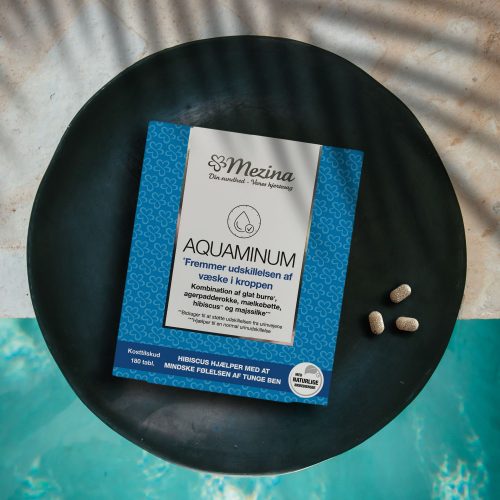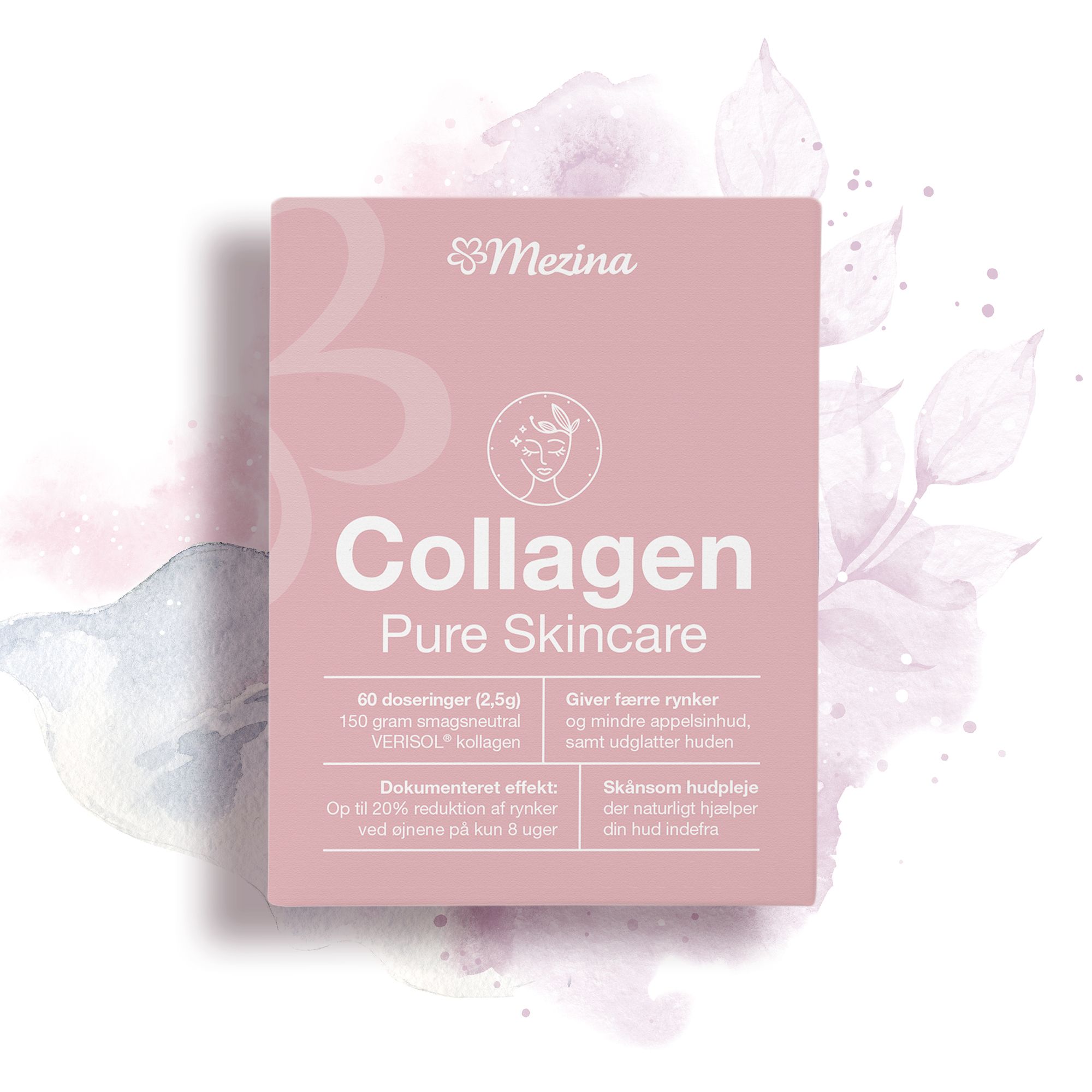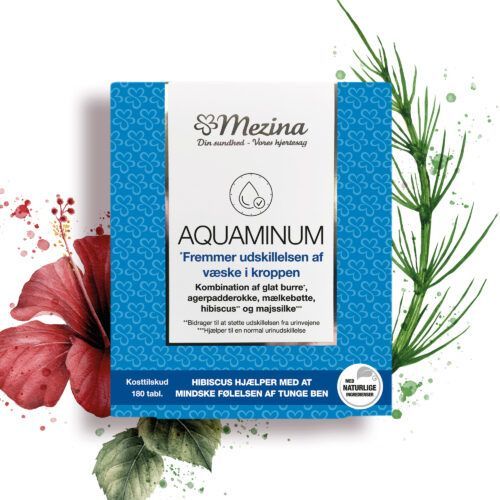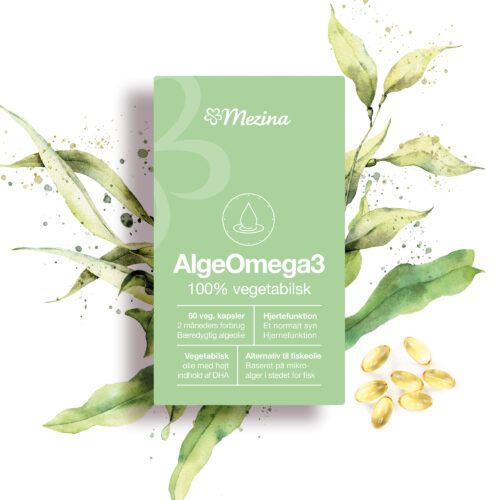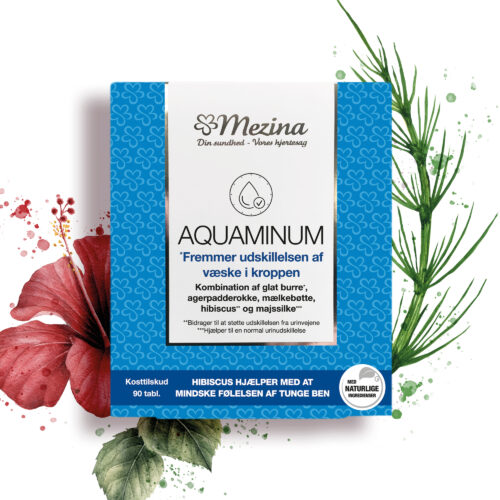Why do we lose collagen in the skin?
The natural collagen production in the body weakens after the age of 35, and we gradually start to develop fine lines and wrinkles on the face. It’s a natural process that affects everyone. However, solid studies have shown that a daily supplement of collagen in powder form (collagen peptides) can reduce wrinkle depth around the eyes by up to 20.1 percent and reduce cellulite by 11.1% in just a few weeks.
With Collagen Pure Skincare, which consists solely of pure, hydrolyzed collagen from VERISOL®, you can provide your body with a supplement that contributes to keeping your skin more youthful and fresh.
Does Collagen Pure Skincare work on wrinkles and fine lines?
By providing the body with specific hydrolyzed collagen peptides, like those in Collagen Pure Skincare, you can both reduce and prevent the formation of wrinkles and fine lines. This effect also applies to lines around the eyes, where solid studies show that you can reduce wrinkle depth around the eyes by up to 20% after 8 weeks of use.
Does it help with cellulite?
Collagen Pure Skincare works throughout the body, not just on the face. The collagen level in our body actually plays a significant role in how smooth and firm our skin can remain as the years go by. Collagen makes up a large part of the body’s connective tissue and is therefore an important factor in strengthening the structure and density of the skin. The collagen in Collagen Pure Skincare has been shown in carefully conducted studies to significantly reduce the amount of cellulite, in just six months.
Is the effect of collagen proven?
Several studies have been conducted on the oral intake of collagen peptides used in Collagen Pure Skincare from Mezina. The studies were carried out by the German company Gelita AG in 2014, where the study results on oral intake of anti-aging collagen peptides with the trademark VERISOL® (which is found in Collagen Pure Skincare) confirmed surprisingly good results for wrinkles and cellulite.
The results strongly confirm that the intake of collagen powder has a real and supportive effect – it can both preempt unwanted signs of aging in the skin and repair the signs that are already visible.
Collagen Pure Skincare – 150 g
Mezina item number 3005
Content per daily dose:
2.5 grams of VERISOL® collagen peptides.
Ingredients:
Collagen hydrolysate from cattle.
Storage:
Store at room temperature, dry, and protected from light. Keep out of reach of small children.
Manufactured for:
Mezina A/S ∙ Energivej 4 ∙ DK-6700 Esbjerg
Consumer contact DK: +45 75 18 16 11
Recommended daily dose: 2.5 grams
Mix in any cold or hot drink. For example, coffee, water, or juice.
The daily dose should not be exceeded.
Dietary supplements should not replace a varied diet. We recommend a varied diet and a healthy lifestyle.
Studies: Documented effect and surprising results
Several studies have been conducted on the oral intake of collagen peptides used in Collagen Pure Skincare from Mezina.
The studies were conducted by the German company Gelita AG (Eberbach, Germany) in 2014, where the study results on oral intake of anti-aging collagen peptides with the trademark VERISOL® could confirm that the results for wrinkles and cellulite were surprisingly good.
The results strongly confirm that the intake of collagen powder has a real and supported effect – both preventive and reparative on unwanted signs of aging in the skin. The studies were conducted as double-blind and placebo-controlled studies. This means that the female test subjects were randomly assigned to two groups, where one group received the active substance, while the other group received a placebo product.
Test results
The test subjects had to take 2.5 g of powder over a given period. Neither the participants in the studies nor those who conducted the measurements knew who received VERISOL® collagen powder and who received a placebo product.
Reduction in wrinkle depth of up to 20.1%
The skin was measured on a total of 114 test subjects (aged 45 to 65 years) immediately before the start, again after 4 and 8 weeks of daily product intake, and finally 4 weeks after the last intake. After 4 weeks, the group that had taken VERISOL® showed a significant reduction in wrinkle depth around the eyes of more than 7.2% on average, compared to the placebo group. After 8 weeks, an average reduction of 20.1% was measured. The maximum reduction was measured at a substantial 49.9%.
Source: View the study on our collagen peptides’ effect on wrinkles by E. Proksch, M. Schunck, V. Zague, D. Segger, J. Degwert, and S. Oesser in Skin Pharmacol Physiol (2014;27(3):113-9).
Reduction in cellulite of 11.1%
Cellulite is a complex problem that affects about 85% of women over 20 years old. It mainly occurs on the thighs, buttocks, and abdomen. A total of 105 female test subjects aged 25-55 years, with cellulite on their thighs, were included in this study and randomized for treatment. After 3 months, it could be concluded that the degree of cellulite was reduced. This remarkable decrease continued for the following 3 months. Therefore, a clear improvement in the skin’s “waves” and texture on the thighs was demonstrated, with an 11.1% reduction compared to the placebo group. Additionally, skin firmness was significantly increased.
Source: View the study on our collagen peptides’ effect on cellulite by M. Schunck, V. Zague, S. Oesser, and E. Proksch in J Med Food (2015; 18(12):1340-8).
Increased skin elasticity
In this study, 69 women aged 35-55 years participated. All had their skin elasticity measured immediately before the start, again after 4 and 8 weeks of daily product intake, and finally 4 weeks after the last intake. The study showed a significant improvement in skin elasticity, averaging 7%, for the group that consumed Verisol® collagen, compared to the placebo group. In some women, a maximum increase in skin elasticity of up to 30% was observed after 8 weeks.
Source: View the study on our collagen peptides’ effect on skin elasticity by E. Proksch, D. Segger, J. Degwert, M. Schunck, V. Zague, and S. Oesser in Skin Pharmacol Physiol (2014;27(1):47-55).
